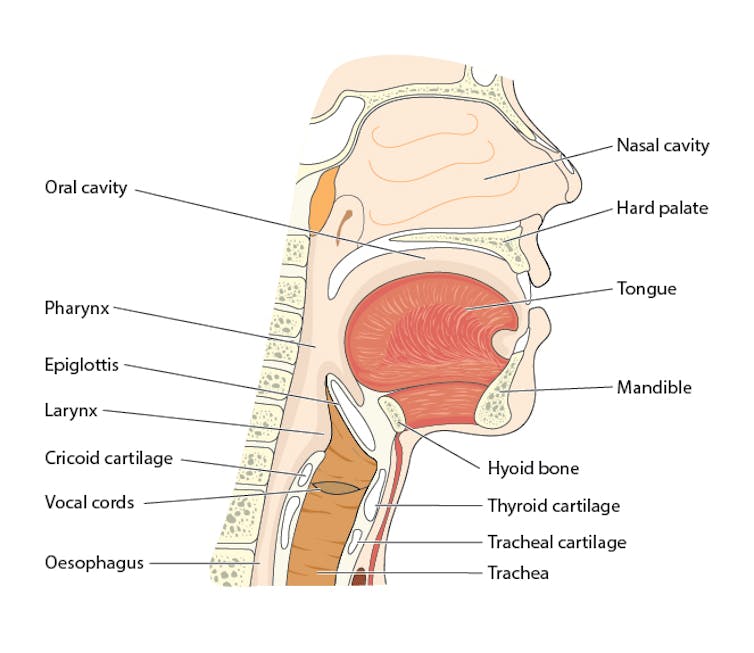 Excuse me!Photo by Natasha Kasim on Unsplash, CC BY-SA
Excuse me!Photo by Natasha Kasim on Unsplash, CC BY-SACurious Kids is a series for children. If you have a question you’d like an expert to answer, send it to curiouskids@theconversation.edu.au You might also like the podcast Imagine This, a co-production between ABC KIDS listen and The Conversation, based on Curious Kids.
Why are burps so loud? - Byron, age 6, Sydney.
That’s a great question Byron. Some burps can be really loud, but they can be quiet too. How loud a burp is depends of a few factors, like how much gas is in your stomach to burp up and the structure of your food pipe that the burp travels along before it leaves your mouth. Let’s look at burps in a bit more detail.
What is a burp?
“Burp” is the word that describes the release of gas that builds up in your stomach and food pipe after eating and drinking. The food pipe, also called the gullet, has the scientific name oesophagus. The oesophagus is a muscular tube, about the length of a ruler, that joins the stomach to the back of your throat.
Where does the ‘burp’ noise come from?
If you open your mouth wide in front of a mirror, you can see a flap of tissue hanging down at the back of your throat. This is called the epiglottis. When you swallow, the epiglottis tips back to block off the windpipe that leads down to your lungs and that means the opening to your food pipe is now clear. (The epiglottis is a bit like a traffic controller.)
 It’s all about the epiglottis and the oesophagus.Shutterstock
It’s all about the epiglottis and the oesophagus.ShutterstockThe noise made when you burp comes from gas that is trapped in your stomach and upper oesophagus when the food pipe is shut. This gas is under pressure, especially when there is a lot of it. As the pressurised gas flows up the food pipe, over the surface of the upper esophagus and past the epiglottis, it makes the surface of the upper part of your oesophagus rattle and vibrate. It is a bit like windows that rattle during a windy storm. The other factor is that because the oesophagus is long and round, the noise echoes as it travels up the food pipe.
Can you make yourself burp more loudly or quietly?
Take an empty cardboard tube from inside a roll of lunch wrap, or a toilet roll. Put your lips over the end and softly hum. This makes a louder noise compared to when you just hum without the tube, because of the echo. Now do it again, but put a lot of power into your hum. The noise is much louder. Forcing more air into the tube makes a louder echo. This is why bigger burps are noisier.
Whether you can make yourself burp more loudly or softly depends on how big your food pipe is and how much gas you have in there. Windows rattle more during a wild storm compared to when there is a gentle breeze blowing.
If you drink a small glass of soda water then you will only have a small amount of gas from the bubbles of carbon dioxide gas in the soda to burp up, but if you drink a whole can and take lots of gulps so you swallow more air and you can hold on so you burp all the gas out in one go, then you can produce a really loud burp.
Babies have small food pipes and small stomachs and produce burps that are more quiet than burps from children and adults.
Where does the gas come from?
The gas comes from a few different places. It can be from air that you swallow when you eat and drink which ends up in your stomach. Some people swallow more air if they eat too fast or when they drink from a straw. The “fizz” in soft drinks is the gas carbon dioxide and some other gasses are produced in your intestines during digestion.
Hello, curious kids! Have you got a question you’d like an expert to answer? Ask an adult to send your question to curiouskids@theconversation.edu.au
 CC BY-ND
CC BY-NDPlease tell us your name, age and which city you live in. We won’t be able to answer every question but we will do our best.
Clare Collins is affiliated with the Priority Research Centre for Physical Activity and Nutrition, the University of Newcastle, NSW. She is an NHMRC Senior Research and Gladys M Brawn Research Fellow. She has received research grants from NHMRC, ARC, Hunter Medical Research Institute, Meat and Livestock Australia, Diabetes Australia, Heart Foundation, Bill and Melinda Gates Foundation, nib foundation, Rijk Zwaan Australia and Greater Charitable Foundation. She has consulted to SHINE Australia, Novo Nordisk, Quality Bakers, the Sax Institute and the ABC. She was a team member conducting systematic reviews to inform the Australian Dietary Guidelines update and 2017 evidence review on dietary patterns for the Heart Foundation.
Authors: Clare Collins, Professor in Nutrition and Dietetics, University of Newcastle
Read more http://theconversation.com/curious-kids-why-are-burps-so-loud-108988
| < Prev | Next > |
|---|
